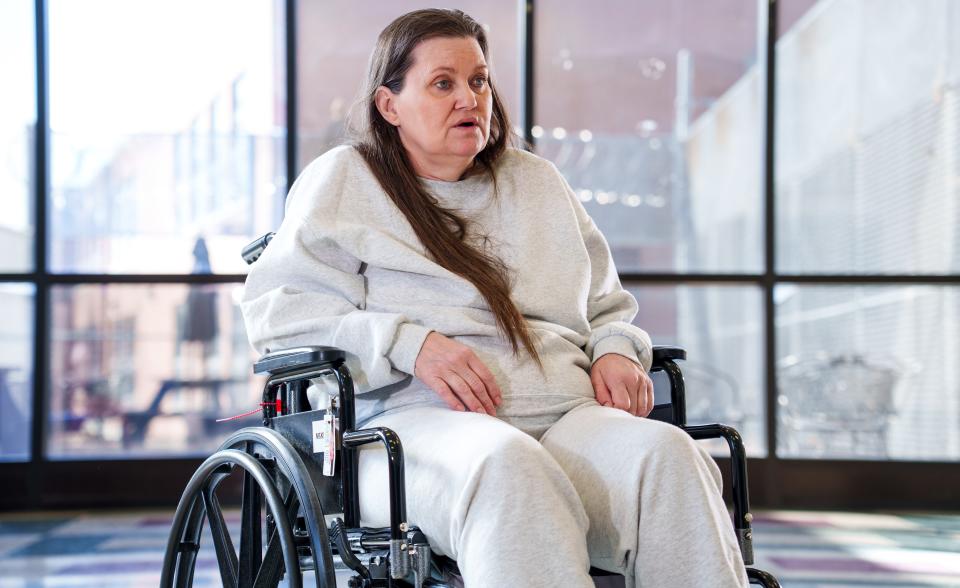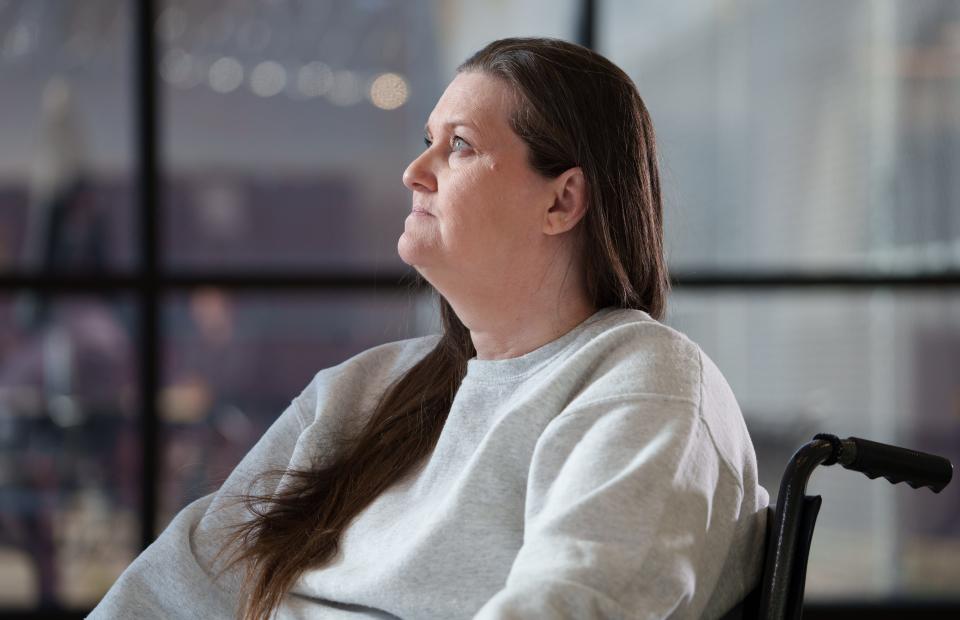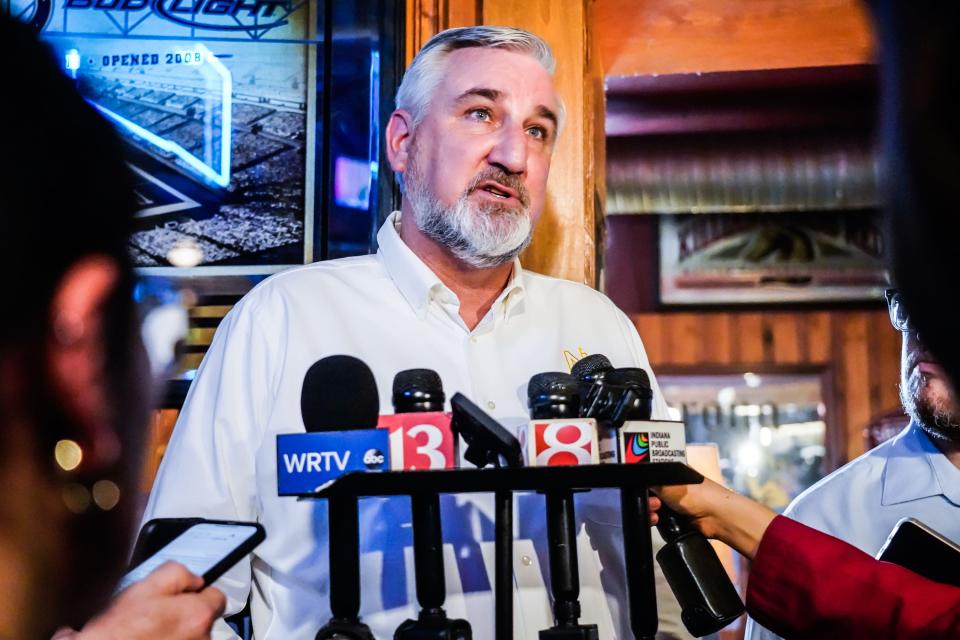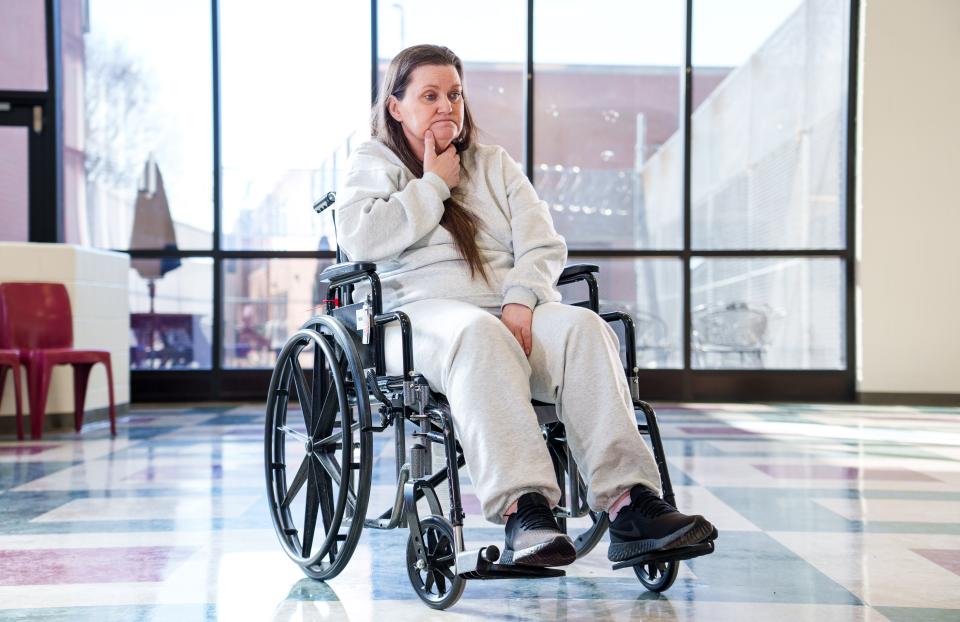Debate: The ethics and economics of keeping nonviolent elderly and gravely ill in prison
Every morning, Travis Nichols walks to the bathroom ― his oxygen tank in tow ― to wash up and brush his teeth. Then he heads back to bed, where he spends most of his days.
When he's not in bed, Nichols is in a wheelchair. Trivial, day-to-day tasks like walking the roughly 30 steps from his bed to the bathroom, or even speaking, leave the 47-year-old out of breath. Severe pulmonary hypertension, a potentially life-threatening condition, has damaged his lungs and is causing his heart to fail. There's one medical option that could prolong Nichols' life ― a heart and lung transplant ― but he and his attorney said it's out of reach because of where he lives.
Nichols is serving a 16-year prison sentence at the Plainfield Correctional Facility on drug charges. He's scheduled to be released in five years, but the Lafayette man, his attorney and his family all fear he won't live that long.
"I'm scared I'm going to die in this place," Nichols told IndyStar. "I don't want to die here. I want to die with my kids, my wife. I want to see my grandkids."
Advocates say Nichols is among a small number of people incarcerated in Indiana prisons ― estimates range from a few dozen to nearly 500 ― who could benefit from "compassionate release." The process allows elderly, dying and severely ill prisoners, who no longer pose a threat to public safety, to seek early release. Supporters say it would provide them an opportunity to seek care outside the prison system and allow dying inmates to spend their remaining days with loved ones.
They also argue it's practical: Housing just one prisoner cost Indiana a little more than $28,000 last fiscal year. And housing sick inmates who need to be transported to the hospital or to regular doctor's appointments places an added strain on an already understaffed prison system.
Compassionate release gained momentum during the early years of the COVID-19 pandemic, when the federal government released thousands of elderly and vulnerable prisoners. But the issue has picked up little traction in post-pandemic Indiana, where recent legislative efforts to release even a fraction of elderly and gravely sick or disabled prisoners have failed.

One compassionate release bill that appeared to have some potential of passing was approved in the House in the 2023 legislative session with a near-unanimous vote. It had the support of both Democrats and Republicans, prosecutors and defense attorneys. But it stalled in a Senate committee, where a key Republican ― Sen. Aaron Freeman ― expressed concerns about the proposal.
Last session, a very similar House bill that would’ve helped 32 nonviolent prisoners ― about 0.1% of the state's adult prison population ― died without a hearing. So did another bill in the Senate that would've benefited 460 inmates, a group that included some convicted of sex and violent crimes.
Freeman, chairman of the Senate Corrections and Criminal Law Committee ― which is critical in passing criminal justice-related bills to the full Senate for a vote ― told IndyStar the efforts behind compassionate release are well intentioned. But the Indianapolis Republican said he's concerned that critical stakeholders, such as judges and prosecutors, would be kept out of the process, and the Indiana Department of Correction would be allowed to "unilaterally decide to release somebody."
Justice or vengeance: At 18, she killed 6 in fire. Will Cindy White, now 66, die in prison?
"We trust judges to hear cases and evidence and make decisions to incarcerate people in the Department of Corrections for whatever period of time," Freeman said. "We need to ensure public safety is at top of mind. All those things are very reasonable."
Courtney Curtis, assistant executive director for the Indiana Prosecuting Attorneys Council, said the organization's position on the issue depends on what the bill actually says about who is involved in making a decision. IPAC supported the latest version of House Bill 1648, the 2023 bill, that passed in the House after it was amended to mirror compassionate release on the federal level.
Advocates say their goal is to create a simpler mechanism for qualified inmates to apply for early release. Prosecutors will still be able to weigh in and judges continue to hold the authority to grant or deny those requests. They also argue imprisoning people who can't care for themselves, let alone commit another crime, is contrary to the goals of the penal system.
"To me," said State Public Defender Amy Karozos, "it seems inhumane to keep these people in prison if it's no longer serving the purpose of why we sent them there in the first place."
Allowing families to say goodbye
Nichols and his wife, Davyn, have been together for almost 30 years. They have three children and three grandchildren, with another one on the way. He was a good father and husband, she said, until he went on a downward spiral.
He got hooked on heroin after several knee surgeries. Then, he switched to methamphetamine, believing it would help him get off heroin.
"But," Nichols said, "all I did was give me another addiction."
In 2016, Nichols was charged with dealing after police caught him with 28 grams of methamphetamine. He was convicted in 2017 and sentenced in early 2018. By then, he had already been diagnosed with severe pulmonary hypertension.
Nichols' attorney, Adam Carter, said prison officials did not provide a reason why he can't receive a transplant while incarcerated. Nichols said, however, that he is not able to get on a transplant list until he's released.
"Everybody is in agreement that he's really sick," said Carter, a state deputy public defender. "He has less time to live than his incarcerated time."
Davyn Nichols constantly worries her husband is not getting the daily medication he needs. She fears his muscles are deteriorating from lying in bed all day everyday. Her greatest fear is that he will die alone.
"I get it that he’s in there with other inmates, nurses and staff," Davyn Nichols said, "but he’s alone."
In an interview with IndyStar last year, Freeman raised concerns that inmates won't have anywhere to stay once released. "For somebody who's terminally ill to go home to see their family ... who can be against that?" he said. "But is that what will be accomplished?"
The Cindy White story: As a teen, Sarah 'Cindy' White set 1975 fire that killed 6. 'It won’t ever be OK.'
Advocates say their goal is to not send sick, institutionalized people out into the streets. The bills introduced in the last two sessions required proof that inmates have a place to stay and will receive care.
"The key here is allowing someone to go home and die, with their family around them. This is important for the family, for their healing, their grieving process," said Kristina Byers, who's part of a coalition advocating for compassionate release.
Byers herself had been incarcerated. She's fairly healthy, but one fear she had was dying behind bars.
"That's a fear anyone has in prison," she said. "You have this fear that something's going to happen and you're not going to be able to be with your family ... They deserve to say goodbye. Why would we not give that to them?"
'From rehabilitation to torture'

Like Nichols, Angela Elliott uses a wheelchair. A severe spinal disorder has kept her from walking. But unlike Nichols, she's been able to undergo surgeries that have made daily life a bit better. She can bathe herself, although it takes her awhile to finish. She can feed herself and help clean her dorm.
Still, records show she needs continuous care that she is not getting in prison. Follow-up surgeries were delayed and rescheduled. A summary prepared by her spine doctor says she missed several necessary appointments that were canceled, pushed back or never scheduled by the prison.
"At some point, it went from rehabilitation to torture," said Elliott, who lives in the medical dorm of the Indiana Women's Prison in Indianapolis. "We're really kind of being tortured because we're just in here rotting away."
Like Nichols, Elliott is serving time for a nonviolent drug crime.
She had her first taste of drugs when her uncle asked her if she wanted to smoke a joint. She was 10. By the time she was in her early teens in a rural Southern Indiana town just north of the Kentucky border, Elliott had dropped out of ninth grade and had replaced school with alcohol, cigarettes and drugs. She graduated to methamphetamine at 18.

After a prison stint in the 2000s, Elliott seemed to have turned her life around. She stayed sober, worked at a meat plant and got married. But just two months after their wedding, her husband died. And Elliott started getting high again.
In 2010, she was caught with nearly half a pound of methamphetamine while riding in her red PT cruiser to meet with a friend she didn't know was a drug informant. A jury convicted her of dealing, a Class A felony, and a judge imposed the maximum sentence of 40 years ― a decade more than the punishment for voluntary manslaughter.
While awaiting trial in a county jail, Elliott began feeling numbness and tingling from her elbows to her fingers. Soon, she was struggling to pick up anything with her left hand.
Andrew Royer's wrongful conviction: Elkhart reaches $11.7 million settlement over wrongful conviction of man with mental disability
By the time she was diagnosed with advanced cervical spinal stenosis in 2013 ― two years after her symptoms began ― her condition had deteriorated. She couldn't bathe and feed herself, or even brush her hair. The paralysis had spread to her legs. She was in constant pain, but said that wasn't even the worst part. She had started defecating on herself.
Her doctor notes the delayed diagnosis and treatment while in prison among the causes of her conditions, records show. Her last surgery was in 2018, Elliott said, and doctors required regular follow-up visits after the procedure. She said she's had only one since then.
The Indiana Department of Correction said it cannot comment on medical treatment plans of incarcerated individuals. "Requests for the compassionate release of incarcerated individuals are evaluated on a case-by-case basis by our medical staff and sent to the Governor’s office for recommendation," the agency said in a statement.
Rep. Robert Morris, a Republican who authored the two failed compassionate release bills in the House, didn't respond to multiple requests for comment. Sen. Rodney Pol, a Democrat who authored the failed Senate bill, said the status quo forces the Department of Correction to take on responsibilities it's not meant to take.
"DOC is not a nursing home. DOC is not a hospice care," Pol said. "DOC is a correctional facility that has specific budgets that provide them with the ability to house convicted felons."
A resources argument
Almost every state has laws allowing some form of compassionate release. But a study by the nonprofit Families Against Mandatory Minimums found these avenues were "sorely underused."
In Indiana, the governor has the power to release elderly and dying inmates through the medical clemency process, but that authority has rarely been used. Indiana governors, who rely on recommendations from the Indiana Parole Board, have granted medical clemencies to only six inmates in the last two decades. Gov. Eric Holcomb issued four of them in 2022 and 2023. Gov. Mitch Daniels issued two in 2006 and 2011. Gov. Mike Pence issued none.

What became clear during the pandemic, said Karozos, the state public defender, is that Indiana needs an easier, simple way for medically fragile inmates to seek early release.
Advocates from both sides of the aisle say a compassionate release statute would do just that.
"It all comes down to a resources argument. We don't have unlimited resources in our prisons," said Patrick Plein, director of the Nolan Center for Justice, the criminal justice reform arm of the American Conservative Union Foundation, one of multiple groups that have been pushing for a compassionate release legislation in Indiana. "The goal is to cut back the bureaucratic tape for people who are becoming a drain on prison resources."
When a sick inmate needs to be transported to a doctor's appointment or to the hospital, he or she must be accompanied by two correctional officers, Maranda Williams, who worked for more than 16 years at IDOC, testified during a committee hearing last year. That meant officers are getting pulled from already understaffed facilities.
Last month, the Nolan Center for Justice wrote a letter to Freeman, urging the senator to support "fiscally prudent, conservative policies" that would help a small group of inmates.
But Freeman has expressed concerns that releasing people would either shift the costs of caring for them elsewhere or leave them without adequate care.
The case of Sarah Jo Pender: 'I deserve to be let home,' Sarah Pender said. The man who prosecuted her agrees.
"I actually went out and toured a DOC facility. I asked to go to the medical unit ... There's people on dialysis there three to four days a week. Under the auspices of being compassionate, if we release somebody who's critically ill, terminally ill out on the street, where are they going to get their medical care?" Freeman said. "As far as I know, we don't have the capacity right now, out in the general public, we don't have enough dialysis machines."
Compassionate release advocates still optimistic
Absent a compassionate release avenue, both Elliott and Nichols have tried to convince the judges who sentenced them to allow them to go home.

Elliott has tried several times. Last year, she cited the various drug and alcohol treatments she's undergone and several programs she's completed in an effort to convince the judge she has changed. All her requests have been denied.
Nichols asked for an early release in 2019, citing his terminal illness. Prosecutors opposed it, arguing Nichols has a long history and was "criminally active" while awaiting trial and even after he was diagnosed. Nichols, for example, admitted he was still taking drugs in late 2017, before his trial, according to court records.
A Tippecanoe County judge denied the early-release request, saying Nichols has yet to present evidence he's likely to receive a transplant if released.
Deidre Eltzroth, Elliott's attorney, said one hurdle has been prosecutors, who are not usually inclined to help ― or even appear to help ― people they put behind bars.
"To be frank," Eltzroth said, "being merciful and compassionate to felons isn't really something a prosecutor wants to be viewed as typically."
But taking prosecutors out of the process was a non-starter for Freeman, who said prosecutors and victims need to weigh in on whether inmates should be released.
The death of Joshua McLemore: Mentally ill man isolated in jail cell for 20 days without care before he died, lawsuit says
Curtis, of the Indiana Prosecuting Attorneys Council, said the authority should rest on the local courts.
"When you have a centralized body like the Parole Board making these decisions, it happens in Indianapolis, far from the communities where the crimes occurred," Curtis said. "It limits the opportunity for victims to be heard. We want to make sure that victims do have rights in our criminal justice system, just as defendants do.
"One thing that Indiana has is fidelity to truth and sentencing," Curtis added, "and that fidelity is not kept if you are removing some functions of the court and giving them to the Parole Board."
Although efforts to pass legislation have stalled, advocates remain optimistic. Karozos, the state public defender, said she's surprised none of the bills moved forward, but she believes the issue will come up again.
Both Nichols and Elliott said they're sorry for living the life that landed them in prison. Elliott said she's "disgusted" with her younger self. Nichols regrets disappointing his family who, for years, did not know about his addiction.
Elliott will be released in 2032, and she will have to rely on her family to get around.
"I'm definitely not going to ask them to take me out to deal drugs," Elliott said. "Physically, we've changed. Mentally, we've changed. Not all people change in prison, but a lot of people do."
Nichols is scheduled to be released in 2029. But his wife fears he won't live long enough.
Contact IndyStar reporter Kristine Phillips at (317) 444-3026 or at kphillips@indystar.com.
This article originally appeared on Indianapolis Star: Sick and elderly drain prison resources, so why aren't they released?

